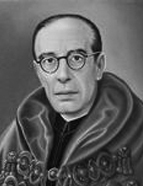

As early as 1915-1916, when discussing the origins of the concept of popular power, the author anticipated a significant theme that would shape his contributions to this field (and remains relevant for historians today): the importance and innovation of neo-scholasticism in Iberian political doctrines, with the development of Thomist thought and, consequently, the "doctrine of initial popular sovereignty", a term the historian used to distinguish it from Rousseau’s democratic theory (Idem, p. 92). As early as 1917, Merêa once again emphasised the innovations of neo-scholastic thought on the international stage. If in 1915-1916 the historian had argued that Iberian authors were pioneers in developing the doctrine of popular sovereignty (a fact that became particularly evident during the years of the Portuguese Restoration), in “Suarez, Jurista. O Problema da Origem do Poder Civil", Merêa went so far as to claim that, contrary to popular belief, Hugo Grotius was not "the bearer of a distinct method and an entirely original doctrinal current". Grócio had found many of his ideas in the Spanish theologians of the 16th and 17th centuries, particularly Francisco Suárez (Idem, p. 177). Later, in 1923, with O poder real e as cortes, Merêa summarised power relations between the Middle Ages and the 19th century. Although the scope of the study is very broad, it should be emphasised that a significant part of the work was dedicated to the most recent centuries between Restoration theorists and nineteenth-century constitutionalism. In 1941, Paulo Merêa published lessons on the History of Political Doctrines: Suárez – Grócio – Hobbes. In these lessons, the professor was less interested in the theory of international law and more focused on these authors' ideas concerning "the State, government, and sovereignty in domestic relations". Merêa chose these names "because they are the three defining figures of this critical era [the emergence of the modern world]". The distant thesis of 1915-1916 was maintained by the professor of 1941: the Spanish neo-scholasticism appeared to be fundamental in the development of modern political ideas, in particular in the formation of "that liberalism which was to play such a great role in 18th century Europe" (Idem, pp. 299-301).
This work is financed by national funds through FCT - Foundation for Science and Technology, I.P, in the scope of the projects UIDB/04311/2020 and UIDP/04311/2020.
